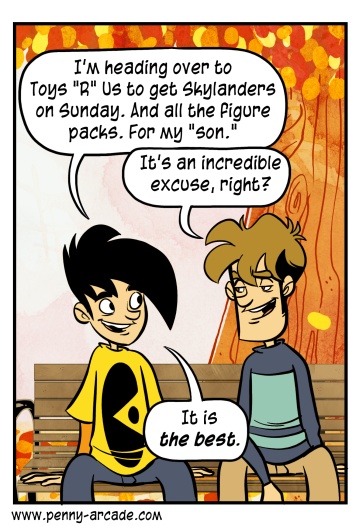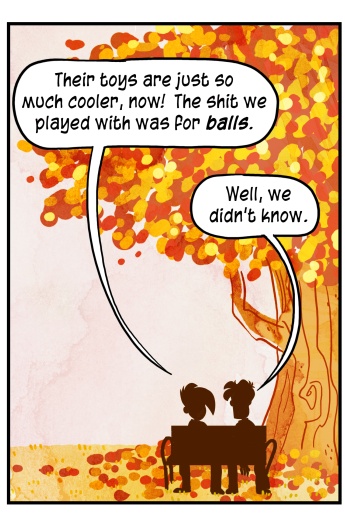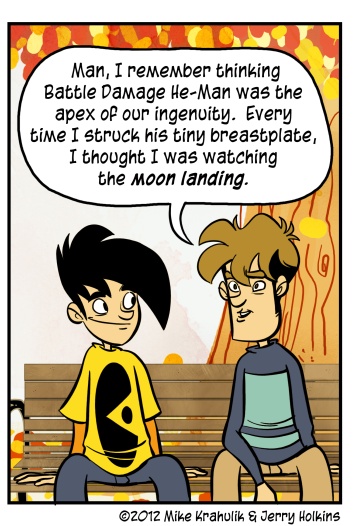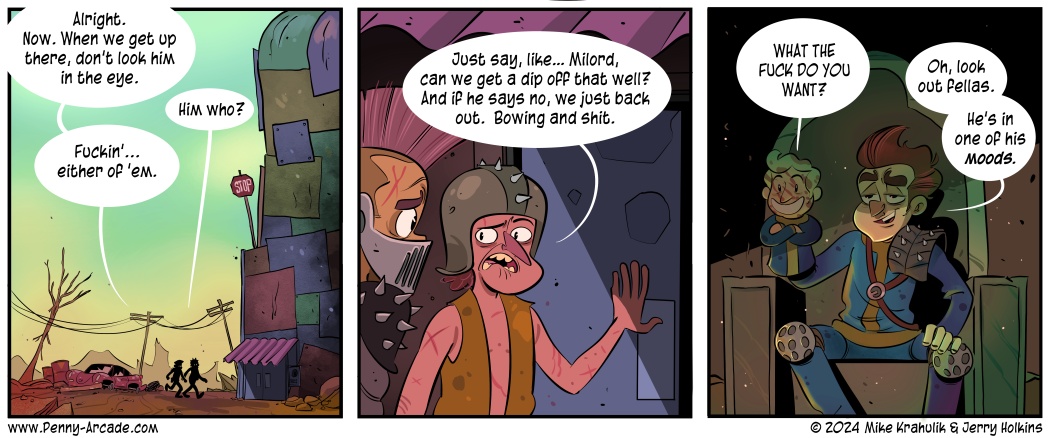Here is the strip.
We were at GDC for something or other a few years ago, and the same dude kept winning awards - over, and over, and over. It was approaching comical levels, and the affection from the throng increased with each distinct victory, until he very nearly broke down. He started to talk about what was possible where games and people intersect, and then light started to shoot out of him. I couldn't believe his energy - it wasn't pure optimism, with its hint of naivete. It was something more like... faith. He is Andy Schatz of Pocketwatch Games, and he has the floor.
OK, so Tycho asked me to write a post for him a few days ago. "When do you need it?" "Uh, how about Wednesday." So yeah, this is what you get when you ask for my finest prose with a two day deadline. Something that sounds like Jesse Pinkman writing on your facebook wall, yo.
Anyways, you may not know me, that's because I'm one of those indie dudes that made a game that won the IGF in 2010 THAT STILL ISN'T OUT YET (Monaco must be the hipster game of the decade: "Oh, you haven't played Monaco yet? You must be a Skyrim fan.")
What kind of asshole enters his game in the IGF before it's done and then decides to delay release for 2 years?

->This kind of asshole<-
And now I'm facing the twin demons of high expectations and wrathful impatience.
Anyways, the game is called Monaco, and it's a 1-4 player co-op heist game. It's played from a top down perspective, it has real time dynamic LOS, and you can play same-screen or online. It's class based, so one person can be the Hacker and another can be the Gentleman and another can be the Redhead. Ok, stop talking, Andy, just post a screenshot!

Oooh! Bloom!
Bear with me here, I'm getting to a point that goes beyond self-promotion. And that point is... Steve Jobs. Just days ago Apple announced that Jobs had passed away, and it's worth talking about some of the ways that his design philosophy influenced my decision making as a game designer.

So let's talk about the one-button mouse.* That thing was a bitch to design games for. I went indie in 2005 after a few years in the AAA industry and was swept up in the casual game boom. This was before the Mac resurgence and well before iOS; Macs only held something like 7% market share. But beyond that, Mac users actually made really good customers. They typically bought games at a higher frequency than their PC counterparts, perhaps because the the dearth of gaming choices. So Mac users made up somewhere around 20% of the casual gaming market, which one couldn't just ignore.
*Note that the one-button mouse wasn't Jobs' design, but his philosophy certainly jibes with the approach to that design.
So you had to design for that fucking one-button mouse. Part of me believes that Minesweeper shipped with every PC just to flip the bird to the poor crippled one-button Mac users.

There's a big philosophical difference between one mouse button versus two. In the case of the PC, your mouse cursor is like a magic wand, a tool, an implement with many uses. It is not a physical projection of your body, but rather a mental projection of your thoughts. The mouse cursor points, but you still must decide what the mouse cursor MEANS when you click it. The branching decision path from your brain to your finger to the cursor is two degrees deep.
On the Mac, the mouse cursor is a projection of your finger. It's physical. Your finger is just a pass through straight to the mouse cursor. And that also requires that anytime you have an object on the screen, that object can only have one meaning, one purpose. All you can do with that object is poke it. Poke poke.
So to bring this ramble back to a point, let me introduce you to Monaco again. In Monaco, there are no buttons*. You navigate your little character around the world with the arrow keys or your thumbstick, and if you want to interact with something, you simply run into it. If you want to unlock a locked door, you push against it until a little timer fills up and -voila- it's unlocked.

I <3 Minigames
*OK, there's one button. I call it the "oh shit button", and it triggers whatever gear you are carrying, such as a shotgun, a smoke bomb, or C4. You use it sparingly, like bombs in Geometry Wars.
This is the part of Monaco's design that I'm most proud of. Because I never have to explain to the player how to interact with an object: it's always the same (poke poke). There's still a ton of complexity to the world, but the interaction is more "physical" than "mental". There's no translation of thought into action - there's no muscle memory that must be trained.
To end on an oblique note, I think this idea of making games more "physical" than "mental" actually frees games up to be MORE cerebral. When the player's mind is occupied trying to translate their intention into action (I want to swing my sword -> 17 buttons+2 analog sticks), it's difficult to put much thought into strategy until the requisite muscle memory is learned (thus the huge barrier to entry for DOTA and the like).
For a while, the gaming industry was held back by our insistence on 3D -- older people, young kids, non-gamers (y'know casual gamers) just didn't have their neurons wired to handle the mental translation of Mouse+WASD = navigation around a 3D world. We insisted on 3D because smart people -- 3D acclimated people -- were perfectly capable of those simple mental contortions. Stupid casuals.
Only when 2D made a resurgence was gaming accessible again. And that's partly because the one-button mouse forced designers to think physically rather than mentally. The mental translation between what the player wanted their character to do, and actually making that happen on-screen, were dramatically lowered (poke poke).
I'm not arguing all game designs should have only one button. We need to make games for everyone (including the smart people, the true gamers, hoo-ah!). But that's my take on how Steve Jobs' obstinate insistence on that fucking one-button mouse helped create the casual game market and in turn, Monaco. Thanks, yo.



